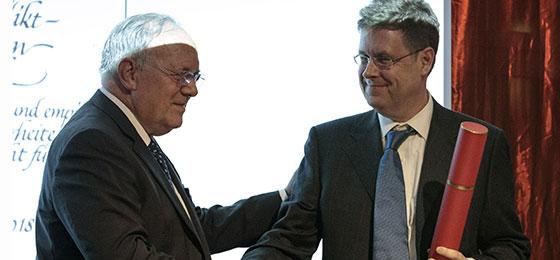Marcel Benoist Science Prize awarded for peace research

On 15 November 2018, ETH Professor Lars-Erik Cederman was awarded the Marcel Benoist Swiss Science Prize for his work in international conflict research.
The Marcel Benoist Swiss Science Prize is the most prestigious science prize awarded in Switzerland. Since 1920, the Foundation has awarded the prize in recognition of outstanding research which is of importance to human life. In the course of its nearly one-hundred-year history, ten prize winners have gone on to win the Nobel Prize. This year’s award ceremony took place on 15 November in Bern. The laudatory speech was given by Professor Scott Gates from the Oslo Peace and Research Institute.
Research to prevent war
Prize winner Lars-Erik Cederman, who is Professor of International Conflict Research at the ETH Zürich, presented his work and explained how he conducts research into the link between inequality and conflict. His team is currently looking at the relationships between the disappearance and formation of states, nationalism and war.
Professor Cederman uses a lot of computer modelling in his research, creating large databases which contain both objective socio-economic data and subjective data such as personal opinions. He uses both statistics and big data analyses, for example of satellite data. Strong light emissions indicate considerable economic activity. Ethnic minorities are often the poorest and most excluded members of society, living in regions with little electric light.
Professor Cederman has also shown that political and economic inequality between the central state and minorities increases the potential for conflict, whereas a balanced distribution of power, wealth and access to basic services can create stability in a country.
From research to politics
The foundation’s chairman Federal Councillor Johann N. Schneider-Ammann paid tribute to the prize winner: “Professor Cederman’s work reminds us the important role that humanities and social sciences play in solving society’s problems.” Mr Schneider-Ammann is sure that scientists recognise trends and new opportunities sooner and more clearly than politicians. “So I hope that these findings in peace building will soon find their way into policy,” he said.
Nominated from among his own ranks
Professor Cederman was nominated for the prize by members of his own research team. This is the greatest endorsement for one’s work, as Mr Schneider-Ammann said. The nomination shows clearly that Professor Cederman and the work he does provides inspiration to a new generation of scientists. “Science is about having the curiosity and courage to question established beliefs. Curiosity and openness are often not enough, though – we also need a supportive environment. Each year the Swiss government invests several billion francs in universities and research. This is money well invested!”
Swiss National Science Foundation selects winner for first time
This was the first year in which the Swiss National Science Foundation (SNSF) was responsible for selecting the prizewinner. “The world of science is complex, and promoting research and selecting the best researchers is not an easy task. The SNSF has innovative procedures to ensure that selection processes are as fair as possible,” explained Matthias Egger, President of the SNSF National Research Council.
Professor Cederman was selected from among 26 nominations. The SNSF evaluation panel consisted of two elected representatives, six international experts, members of the SNSF National Research Council and a representative of the Marcel Benoist Foundation. The selection process was largely digital and anonymous. The candidates’ gender, publication list and university were only disclosed to the evaluation panel in the second evaluation round.